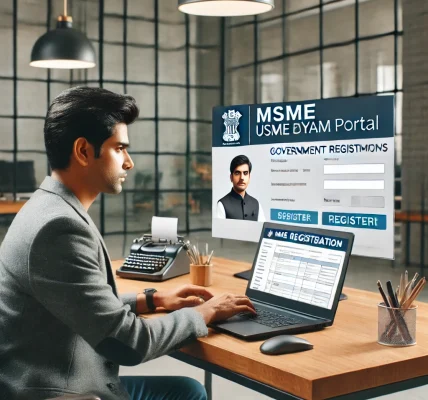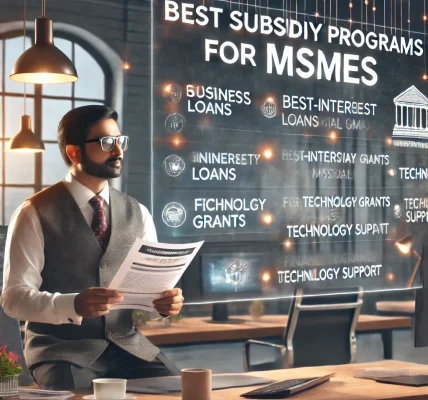In the modern business ecosystem, Micro, Small, and Medium Enterprises (MSMEs) play a critical role in driving economic growth, creating jobs, and fostering innovation. Despite their significant contribution, MSMEs often face challenges in accessing large-scale business opportunities, especially when competing with bigger corporations. However, one area where MSMEs can tap into considerable potential is through government tenders and contracts.
The government is one of the largest procurers of goods and services in most countries. For Indian MSMEs, leveraging government tenders and contracts is not only a chance to grow but also a viable path to long-term success. With various schemes, policies, and incentives in place, MSMEs are provided an excellent opportunity to win government contracts and expand their businesses. In this blog, we will explore how MSMEs can leverage government tenders and contracts, the benefits involved, and tips for success.
What Are Government Tenders and Contracts?
Government tenders are formal offers from the government inviting businesses to provide goods or services for public projects. These contracts are typically awarded after a competitive bidding process, and the government seeks the best value for money.
Government contracts refer to agreements made between the government and a business for the supply of goods, services, or execution of projects. These contracts can range from large infrastructure projects to the procurement of goods and services for daily governmental functions.
For MSMEs, engaging with government tenders and contracts offers a unique opportunity to access larger markets, diversify their business, and stabilize cash flows. In India, the Government of India is one of the largest buyers of goods and services, accounting for a significant percentage of national procurement.
Benefits of Government Tenders for MSMEs
Government tenders and contracts provide numerous advantages for MSMEs, some of which are outlined below:
1. Access to Large-Scale Business Opportunities
Government tenders allow MSMEs to tap into high-value business opportunities that would otherwise be out of reach. The public sector has diverse needs, ranging from construction, technology, and healthcare to defense and education. By participating in these tenders, MSMEs can gain access to lucrative and consistent work.
2. Reduced Competition
The government often sets aside a percentage of contracts for MSMEs under special schemes like public procurement policies. These set-asides give MSMEs a better chance to win contracts as they face less competition from large multinational corporations.
3. Steady Cash Flow
Government contracts usually come with a formal payment cycle, ensuring steady cash flow for MSMEs. These payments are typically secure, as they are funded by the government, providing financial stability for businesses.
4. Credibility and Reputation
Winning government tenders can significantly enhance the credibility and reputation of MSMEs. A successful contract with the government is a testament to the company’s reliability, quality, and capability, which can help in acquiring future business from both the public and private sectors.
5. Financial and Tax Benefits
The government often offers tax exemptions, subsidies, and financial aid for MSMEs that participate in government procurement programs. Various schemes like the Make in India initiative encourage MSMEs to bid for government contracts, providing financial backing to facilitate their growth.
Government Tendering Schemes and Policies for MSMEs
The Indian government has introduced several policies and initiatives to assist MSMEs in leveraging government tenders and contracts. These initiatives ensure MSMEs are encouraged to participate and given a fair chance to compete.
1. Public Procurement Policy for MSMEs
Under this policy, the government has set aside a certain percentage of tenders exclusively for MSMEs. The objective of the policy is to help MSMEs win contracts and grow their businesses, ensuring they get a fair share of the overall procurement process.
Key Features:
- 25% Reservation for MSMEs: 25% of the total annual procurement from government departments is reserved for MSMEs. Out of this, 3% is earmarked for women entrepreneurs.
- Ease of Bidding: MSMEs can participate in government tenders without the need for prior experience or large-scale infrastructure.
- Subsidy on Bid Fees: The government provides subsidies to MSMEs on bid fees and other related charges.
2. Government E-Marketplace (GeM)
The Government e-Marketplace (GeM) is an online platform introduced by the Indian government for the procurement of goods and services by various government departments. MSMEs can register on GeM and bid for government contracts for various goods and services.
Key Features:
- Simplified Bidding Process: The platform offers a user-friendly interface, simplifying the process of bidding for government contracts.
- Transparency: All government tenders and contracts are made available on the GeM portal, ensuring transparency and equal opportunity for MSMEs.
- Access to Nationwide Contracts: MSMEs can access contracts from government agencies across India, increasing their reach and potential clientele.
3. Make in India Initiative
The Make in India initiative encourages MSMEs to manufacture and supply products to government organizations, with an emphasis on indigenous production. This scheme promotes domestic manufacturing, making it easier for MSMEs to participate in large government tenders.
Key Features:
- Priority for Domestic Products: The initiative prioritizes local products, enabling MSMEs to have a competitive edge over foreign suppliers.
- Support for Manufacturing Infrastructure: The government provides financial and infrastructural support to MSMEs involved in manufacturing, encouraging them to scale up and meet the demands of government contracts.
4. MSME Development Act
The MSME Development Act focuses on promoting the development and competitiveness of MSMEs, especially in the areas of access to government contracts and financial support. The Act includes various provisions to streamline the tendering process for MSMEs and make it easier for them to participate.
How MSMEs Can Leverage Government Tenders and Contracts
While government contracts offer immense opportunities, there are steps MSMEs must take to position themselves for success. Here are some essential tips to help MSMEs leverage government tenders and contracts:
1. Register and Get Certified
The first step to participating in government tenders is registering your business. For MSMEs, the Udyam Registration is mandatory to qualify for government schemes and procurement processes. This registration process makes it easier for MSMEs to avail themselves of the benefits and reservations available under government policies.
Action Points:
- Register your MSME on platforms like GeM and ensure you have the necessary certifications.
- Obtain a Digital Signature Certificate (DSC) and Tax Identification Number (TIN), which are often required for tender submissions.
2. Understand the Tendering Process
Before submitting bids, MSMEs must understand how government tenders work. Government tenders involve detailed specifications, documentation, and compliance with regulatory requirements. Therefore, it’s important to thoroughly study the tender documents, understand the terms and conditions, and assess the financial feasibility.
Action Points:
- Study the Request for Proposal (RFP) and tender documents carefully.
- Assess whether the tender aligns with your company’s capabilities and resources.
3. Offer Competitive Pricing
In government procurement, cost plays a significant role in decision-making. While price is not the only criterion, offering a competitive price while maintaining quality can make your bid stand out. Consider the long-term cost benefits of working with the government, which may lead to more contracts in the future.
Action Points:
- Conduct a cost-benefit analysis to price your offerings competitively.
- Ensure that the cost quoted in the tender is both sustainable and profitable for your business.
4. Maintain Quality and Compliance
The government is strict about quality standards and compliance with environmental and safety regulations. MSMEs must ensure that their products or services meet the required specifications and quality standards.
Action Points:
- Implement quality management systems such as ISO certifications to demonstrate compliance.
- Focus on continuous improvement and innovation to stay ahead of competitors.
5. Build Relationships and Network
Networking is key to success in the government procurement space. Building relationships with government officials, industry experts, and other businesses can provide valuable insights and opportunities.
Action Points:
- Attend government procurement fairs, seminars, and events to network with potential clients.
- Engage with industry groups and online forums to stay informed about upcoming tenders and regulations.
Conclusion
Government tenders and contracts represent a valuable opportunity for MSMEs to expand their businesses and contribute to public sector development. By understanding the various government policies, platforms, and schemes, MSMEs can effectively tap into this lucrative market. While the process can be competitive, the benefits, including steady cash flow, enhanced credibility, and access to large-scale projects, make it worthwhile.
With the right strategies, knowledge, and preparation, MSMEs can successfully leverage government tenders to grow their businesses and create long-term success.




